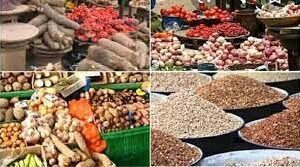As part of effort to implement the National Gender Policy thrust in mainstream women farmers in all agricultural value chains, the Ministry of Agriculture and Rural Development, (FMARD), has trained South-East women farmers on climate change mitigation and adaptation.
A statement by the Deputy Director, Information of the Ministry, Mrs Eno Olotu, said the Minister of Agriculture and Rural Development, Dr. Mohammad Mahmoud Abubakar, speaking at the 4th edition of the activity taking place in the South-east regional workshop on Gender Mainstreaming, Climate Change Mitigation and Adaptation Strategies for women farmers recently at the Claibon Hotel, Owerri, Imo state, has affirmed the ministry’s commitment in gender mainstreaming at all levels of the agricultural sector, stating that the 2019 approved National Gender Policy thrust is to achieve gender based reforms that cuts across all value chains of the agricultural sector.
Abubakar, who was represented by the Imo State Director, FMARD, Pastor Chris Iwuchukwu, explained that the policy thrust of the 2019 National Gender Policy is “hinged on gender equity and equality for optimum productivity in the agricultural sector”.
According to the minister, “This ultimately would ensure commitment to gender mainstreaming at all levels of the agricultural sector, which is seen as a tool for achieving gender-based reforms and increasing productivity by men and women along all the value chains in the sector.
The minister said the workshop “is targeted, innovative and timely when viewed from the outcomes of the recent 2021 COP 26 climate change conference held in Glasgow , United Kingdom.
He said, “Nigeria’s agriculture is most vulnerable and susceptible to the impacts of climate change. Indeed, it is rain-fed dependent. Any change in the weather pattern, in terms of the amount, intensity, duration, and the on-set, duration affect farmers decisions on when, what and where of the crops and inputs as well as other cultural operations in the value chain. Climate change and variability affects particularly women who constitute the most vulnerable among the farming communities”.
“Available statistics indicate that women constitute about 80% of the labour force involved in agricultural production, grow up to 80% of the food in Nigeria. Overall, they constitute about 43 % of the agricultural labour force in developing countries. Yet, women farmers face various challenges and needs especially climate change and variability, access to information and technologies”, the minister stated.
Dr Abubakar explained that the choice of Imo state as one of the pioneer states to kick-start the series of outlined workshops is borne to the fact that the State is one of the frontline states within the rainforest agro-ecological zones in Nigeria facing ecological challenges due to the impact of climate change.
While admonishing the participants to pay rapt attention during the training workshop, the Minister expressed optimism that the workshop will expose them to climate change adaptation and mitigation strategies that would help to build and enhance their resilience to threats and impacts of climate in agricultural production.
In his welcome remarks, the Hon. Commissioner of Agriculture and Natural Resources in Imo State, Dr. Okorochukwu Barthy said that the essence of the mitigation and adaptation strategies workshop for women farmers is to ensure increase in food sufficiency which will in turn translate to food security and economic growth in the country.
He said that to improve food sufficiency especially in the South -East, “we must get more women farmers that will produce more food”, adding that climate change portends the need for mitigation and adaptation to ensure more farming seasons in a given year.
The Commissioner applauded the women for the crucial roles they play in food production, processing and marketing, advising them to learn the new strategies that will help develop their resilience to mitigate the climate change impacts.
Director, Special Duties in the ministry, Mrs. Faust Lawal represented by the Head, Gender Unit in the Ministry, Mrs. Ifeoma Anyanwu, recalled that the thrust of the National Gender Policy is to reduce the vulnerability of women in agriculture especially in their access to inputs, feeds, finance and information so that they can contribute meaningfully to agriculture.
She also informed that the policy focus on addressing the disparity in the sector, build skills and competencies of the Nigerian women farmers in line with the SDG No. 13, which specifically addresses climate change and its impacts.




